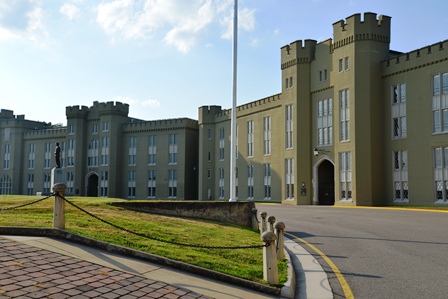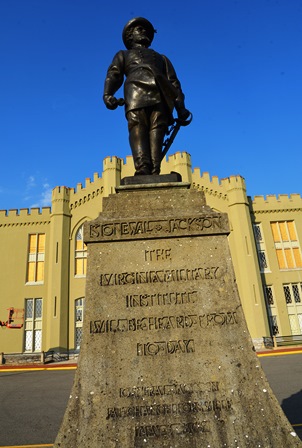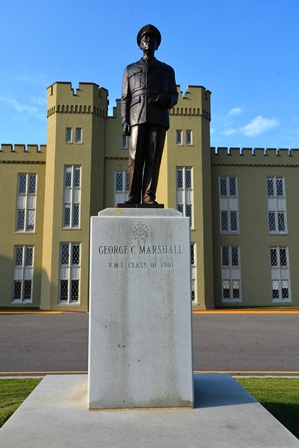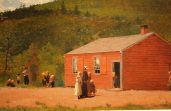Patriot or Traitor
Stonewall Jackson, George Marshall and Honor
“The heart of VMI’s student government is the honor system. Although honor, like many idealistic concepts, defies exact definition, it clearly refers to relationships which govern society and which yield to the members of that society immediate and tangible benefits. The honor system at VMI is not so much a set of rules—although rules are published and distributed to every cadet—as it is a way of living. Lying, cheating, stealing, or tolerating those who do are considered violations of the Honor Code. A cadet’s statement in any controversy is accepted without question as truthful; examinations are not proctored; the word “certified” on a paper means that the work is the cadet’s own and that the cadet has neither given nor received help.
The Corps as a whole has always been the guardian of its own honor, and its honor is its most cherished possession. To administer the system, the Corps elects an Honor Court. Any suspected violation is reported to this Honor Court, which conducts an investigation of the circumstances. An accused cadet may admit guilt and leave the Institute or may request trial. If found guilty, the cadet is dishonorably dismissed. If the accused is acquitted, the case is closed, and all records pertaining to the case are destroyed.”
~ From the Virginia Military Institute, explanation of the their Honor System ~
http://www.vmi.edu/content.aspx?tid=36579&id=1330&ekmensel=8f9c37c3_66_92_1330_1
Approaching the Virginia Military Institute (VMI), even in a car, makes you sit up a bit taller, push your shoulder’s back, and brush your skirt off; you suddenly want to make sure that you are squared away. The oldest, state financed, military college, in the United States is an impressive institution, both in its physical presence, dominated by Gothic Revival architecture, and its history of producing outstanding cadets, who excel academically, physically, and morally. The school’s Honor Code demands integrity or expulsion; and believes that her cadets intrinsically know the difference between right and wrong, an idea I find intriguing.
The state of Virginia’s slogan is: Virginia is for Lovers, that may be; but the home of our first permanent settlement, at Jamestown, as well as major battles in the Revolutionary War and the American Civil War, and the birthplace of numerous Presidents and Patriots, and home to VMI, to me screams out history! It is impossible to spend time in Virginia, and not think about the complex history of the United States and people who have defined her.
So many of our founding fathers, from Virginia, were men held in high regard in their British colony, men who actively contributed to their society and were certainly considered men of honor; yet they took up arms and broke the law when they decided that Patrick Henry was right when he said: “Is life so dear, or peace so sweet, as to be purchased at the price of chains and slavery? Forbid it, Almighty God! I know not what course others may take; but as for me, give me liberty or give me death!”
http://en.wikipedia.org/wiki/Give_me_liberty,_or_give_me_death!
Before arriving at VMI, I had stopped at President Woodrow Wilson’s first home, which like his last home, is located in Virginia and are available to tour. My thoughts were heavily immersed on President Wilson, as I wondered whether or not he was a man of honor? He campaigned for a second term in office, on the slogan: “He kept us out of war.”; yet, unapologetically, led America into World War I. Did he take us into war because the Germans were sinking unarmed civilian and merchant vessels or because he thought there was a moral need to put an end to the bloodshed, or because he worried history may judge him cowardly? Likewise, he allowed women to be imprisoned and force fed, with tubes attached to funnels, being shoved down their throats, for protesting in favor of suffrage, while later stating: “We have made partners of the women in this war… Shall we admit them only to a partnership of suffering and sacrifice and toil and not to a partnership of privilege and right?” He oversaw the passage of the 19th Amendment which finally gave women the vote. Was he swayed by his daughter or wife? Did he want to appease the women who had indeed gone to war with him? Or was he once again worried about his place in history? Did he do the right thing because he knew what was right or because he worried about how he would be perceived?
http://www.wilsoncenter.org/article/woodrow-wilson-and-the-womens-suffrage-movement-reflection
What defines us as a people of honor? Do we know the difference between right and wrong? Does being a law abiding citizen makes us honorable? Who decides what is right and what is wrong? Is it permissible to break the law, if we view it as unjust? Are right and wrong moving targets? Can we take-up arms against the government and still have honor?
Like most collegiate institutions, the VMI campus is dotted with monuments, including a statue of George Washington, a Virginian, a military leader, and our first Commander in Chief – it feels right that he should be so honored here; I cannot imagine anyone protesting his place on the campus. But in front of the student barracks, on the parade grounds, there are two more prominent statues, one is of Stonewall Jackson and the other is of George Marshall; and both brought me to a pause, as I walked around the campus.
General Thomas Jonathan “Stonewall” Jackson, a former instructor at VMI, became one of the Confederates most outstanding leaders, on the field of battle, from the Valley Campaign to Chancellorsville, the first Battle of Bull Run, the Second Battle of Bull run, Antietam, and Fredericksburg; and had he not died, the war might well have turned out rather differently. While General George Catlett Marshall Jr., a graduate of VMI, the first five-star American General, served as President F.D. Roosevelt’s Chief of Staff of the U.S. Army, as well as President Harry S. Truman’s Secretary of State and Secretary of Defense, drafted the Marshall Plan, to rebuild Europe, after World War II, and earned a Nobel Peace Prize. I knew all of this, as I looked at both of the statues, but somehow, despite both men’s accomplishments, as I walked away from the VMI campus, I kept wondering about the company President Washington was keeping.
Stonewall Jackson seemed like an obvious objection. Had he not betrayed America? Had he not taken up the cause of the South to destroy the Union and sought to protect slavery? Had he not gone to war against his fellow cadets from West Point? He had indeed. Yet, Jackson having been left orphaned, and sent to live with relatives, had offered to teach his uncle’s slave to read in exchange for pine knots, which Jackson used to read by, as he educated himself; and yes, once the slave learned to read, he ran away from his master. While teaching at VMI, he also helped to establish a Sunday school for black residents, and addressed his students by name, though it should have been a given, it was not, at the time. He was a slave owner, though history shows that two of his six slaves asked that he purchase them, one in order to work toward his freedom. It is said that Jackson viewed slavery as an institution established by God, and thus did not challenge it, but rather felt that he was to treat his slaves fairly. Is there honor in his actions?
http://en.wikipedia.org/wiki/Stonewall_Jackson
Surely I could not object to George Marshall, with such a fine list of accomplishments, and a life devoted to service to the United States of America, though I did. One might argue that I took issue with his implementation of a 90-division Army, with an individual replacement system, where newly trained men were dropped into units, already in the field, to replace fallen soldiers, without the benefit of spending time with the unit, ahead of combat, leading to an extremely high rate of causality, fatigue, and illness. Or is it that I found fault with his role in delaying information regarding the attack on Pearl Harbor? Did I blame Marshall for pressuring the Nationalist into a ceasefire, giving Mao Zedong and his Communist the victory in China? Or was my only issue with him, his insistence that President Harry S. Truman not recognize Israel? It was – I objected to his anti-Semitic stand; especially having witnessed what the Jewish people had gone through, at the hands of the Nazi’s, how could he not support the United States recognizing Israel?
After I left VMI, I continued to wonder about these two American generals and the lives they led. President Lincoln had insisted on amnesty and forgiveness, believing that what mattered was reuniting the Union. History proved Lincoln correct, as it has Truman, regarding Israel. But what about Jackson and Marshall, did history judge them as men of honor? It seems that history has been kind, from naming building and ships after them, to issuing postage stamps with their images, and celebrating birthdays, awarding them medals, preserving their homes, creating museums for them, and of course erecting statues of them. America and VMI, at least, have made their peace with both men.
Are they worthy of such accolades? Do we judge them for the way they lived their entire lives or for a singular choice? Is Jackson unworthy of recognition because he supported the Confederacy? Is Marshall unworthy of recognition because he did not support Israel?
I surprise myself, finding I am more able to forgive Jackson than Marshall; not that either require my forgiveness. Did they live their lives with honor? Oddly, the more I think about them, the less I feel able to judge them. I believe we are defined by our choices, but I also know that sometimes our choices are dictated by circumstances over which we have no control. Must we know the heart and mind of a man, in order to understand their choices?
I would like to believe that there are absolutes, that right and wrong are self-evident; but the older I get and the more I experience, the harder it is to stand on certainty. I will embrace that it could not have been easy to take up arms against your former country; but that believing in States rights, you felt your course of duty clearly laid out, and fought the good fight. But, I cannot accept that one would spend their entire life in service to a nation, which stands for democracy, and freedom of expression, and the right to practice your faith without persecution, and not support the birth of Israel, which represents all of these ideals. However, I do support VMI’s right to honor whomever they choose; that is all for now.














